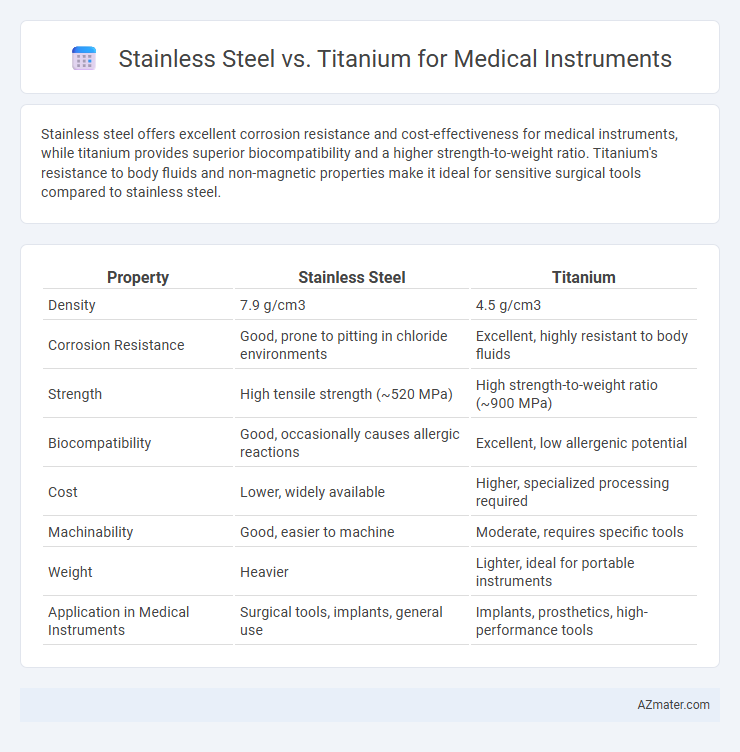Stainless steel offers excellent corrosion resistance and cost-effectiveness for medical instruments, while titanium provides superior biocompatibility and a higher strength-to-weight ratio. Titanium's resistance to body fluids and non-magnetic properties make it ideal for sensitive surgical tools compared to stainless steel.
Table of Comparison
| Property | Stainless Steel | Titanium |
|---|---|---|
| Density | 7.9 g/cm3 | 4.5 g/cm3 |
| Corrosion Resistance | Good, prone to pitting in chloride environments | Excellent, highly resistant to body fluids |
| Strength | High tensile strength (~520 MPa) | High strength-to-weight ratio (~900 MPa) |
| Biocompatibility | Good, occasionally causes allergic reactions | Excellent, low allergenic potential |
| Cost | Lower, widely available | Higher, specialized processing required |
| Machinability | Good, easier to machine | Moderate, requires specific tools |
| Weight | Heavier | Lighter, ideal for portable instruments |
| Application in Medical Instruments | Surgical tools, implants, general use | Implants, prosthetics, high-performance tools |
Introduction to Medical Instrument Materials
Stainless steel and titanium are the primary materials used in medical instruments due to their durability and biocompatibility. Stainless steel offers excellent corrosion resistance and strength, making it ideal for surgical tools that require frequent sterilization. Titanium is favored for its lightweight nature, superior biocompatibility, and resistance to body fluids, making it suitable for implants and specialized instruments.
Overview of Stainless Steel in Medical Devices
Stainless steel is widely used in medical instruments due to its exceptional corrosion resistance, strength, and biocompatibility, making it ideal for surgical tools and implants. Grades such as 316L stainless steel offer enhanced resistance to bodily fluids and sterilization processes, ensuring durability and safety. Its cost-effectiveness and ease of fabrication also contribute to its widespread adoption in medical device manufacturing.
Overview of Titanium in Medical Devices
Titanium is widely used in medical devices due to its exceptional biocompatibility, corrosion resistance, and superior strength-to-weight ratio compared to stainless steel. Its lightweight nature reduces patient discomfort, while its ability to osseointegrate makes it ideal for implants such as orthopedic screws and dental fixtures. Titanium's non-toxic properties and resistance to bodily fluids ensure long-term durability and minimal risk of allergic reactions in medical applications.
Biocompatibility: Stainless Steel vs Titanium
Titanium exhibits superior biocompatibility compared to stainless steel, making it ideal for medical implants due to its ability to resist corrosion and minimize allergic reactions. Stainless steel, while durable and cost-effective, can cause metal ion release and potential hypersensitivity in some patients. The enhanced osseointegration properties of titanium support better tissue integration, reducing inflammation and promoting faster healing in medical applications.
Corrosion Resistance Comparison
Titanium exhibits superior corrosion resistance compared to stainless steel due to its stable oxide layer, which effectively protects against pitting and crevice corrosion in aggressive bodily fluids. Stainless steel, particularly 316L grade, offers good corrosion resistance but is more susceptible to localized corrosion under chloride-rich conditions often encountered in medical environments. Titanium's biocompatibility and inertness make it the preferred choice for long-term implantable medical instruments requiring exceptional resistance to corrosive biological agents.
Strength and Durability Analysis
Titanium exhibits superior strength-to-weight ratio and corrosion resistance compared to stainless steel, making it ideal for long-lasting medical instruments. Stainless steel provides excellent hardness and wear resistance, but is heavier and more prone to corrosion in harsh environments. Titanium's biocompatibility combined with its durability ensures enhanced performance and longer lifespan in surgical tools and implants.
Weight and Handling Differences
Stainless steel medical instruments are heavier, providing durability and resistance to corrosion, which offers stability during procedures but can cause hand fatigue with prolonged use. Titanium instruments weigh about 40% less than stainless steel, enhancing precision and reducing hand strain, making them ideal for delicate and extended surgeries. The lighter weight and superior strength of titanium improve maneuverability, though it comes at a higher cost compared to stainless steel.
Cost Considerations for Hospitals and Clinics
Stainless steel offers a cost-effective solution for hospitals and clinics due to its lower initial price and widespread availability compared to titanium, making it ideal for budget-conscious medical facilities. Titanium instruments, while significantly more expensive upfront, provide superior corrosion resistance and durability, reducing long-term replacement costs and instrument downtime. Evaluating both materials requires balancing initial investment with lifespan and maintenance expenses to optimize medical instrument procurement budgets.
Applications Best Suited for Each Material
Stainless steel is widely used in medical instruments requiring high strength, corrosion resistance, and cost-effectiveness, such as surgical tools, dental implants, and orthopedic devices. Titanium's biocompatibility, lightweight nature, and exceptional corrosion resistance make it ideal for implants, pacemaker cases, and instruments used in long-term body contact. Surgical instruments exposed to sterilization processes and high-stress environments benefit from stainless steel, while titanium is preferred for implantable devices where weight and compatibility with bone integration are critical.
Conclusion: Choosing the Right Material for Medical Instruments
Stainless steel offers excellent strength, corrosion resistance, and cost-effectiveness, making it a reliable choice for a wide range of medical instruments. Titanium provides superior biocompatibility, lightweight properties, and enhanced corrosion resistance, ideal for implants and devices requiring long-term body interaction. Selecting the right material depends on the specific medical application, balancing factors such as durability, patient safety, and budget constraints.

Infographic: Stainless steel vs Titanium for Medical instrument
 azmater.com
azmater.com